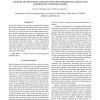Free Online Productivity Tools
i2Speak
i2Symbol
i2OCR
iTex2Img
iWeb2Print
iWeb2Shot
i2Type
iPdf2Split
iPdf2Merge
i2Bopomofo
i2Arabic
i2Style
i2Image
i2PDF
iLatex2Rtf
Sci2ools
ICASSP
2010
IEEE
2010
IEEE
A survey of implementation efforts and experimental design for cooperative communications
Design and analysis of cooperative communication schemes based upon modeling and simulation exist in large quantities in the research literature. Despite this fact, there have been relatively few efforts directed toward implementing and experimentally evaluating such schemes. Cooperative protocols have many components that make them challenging to implement in real-world radio architectures, and their expected gains are highly dependent on the network topology and RF environment in which they operate. As such, experimental work will be crucial in the transition of such schemes from conceptual proposals to next-generation wireless standards. This paper motivates such practical work, surveys existing efforts in the area, and offers future direction for architectural and experimental design.
Cooperative Communication Schemes | Cooperative Protocols | ICASSP 2010 | Real-world Radio Architectures | Signal Processing |
Related Content
| Added | 06 Dec 2010 |
| Updated | 06 Dec 2010 |
| Type | Conference |
| Year | 2010 |
| Where | ICASSP |
| Authors | Glenn Bradford, J. Nicholas Laneman |
Comments (0)

